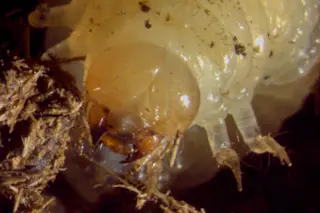Horned beetle Onthophagus taurus. (Credit: PNAS) As humans, sexually-transmitted microbes worry us. They can cause some pretty nasty diseases, and we've learned to take precautions. But, some creatures actually welcome the tiny hitchhikers that can jump ship during mating. For dung beetles, the act of procreation can sometimes come with an extra benefit: Nematode worms. Just as there are countless species of bacteria living on and in us that help our bodies out, not every sexually-transmitted creature is out to cause harm. For the dung beetle Onthophagus taurus, one of those is a type of nematode worm that helps cultivate the right mix of bacteria and fungi to ensure the beetle larvae stay fed and healthy.
Diplogastrellus monhysteroides live on and around the dung beetles, probably because the beetles attract a selection of bacteria the worms like to eat. As it turns out, many of those bacteria are bad for ...














